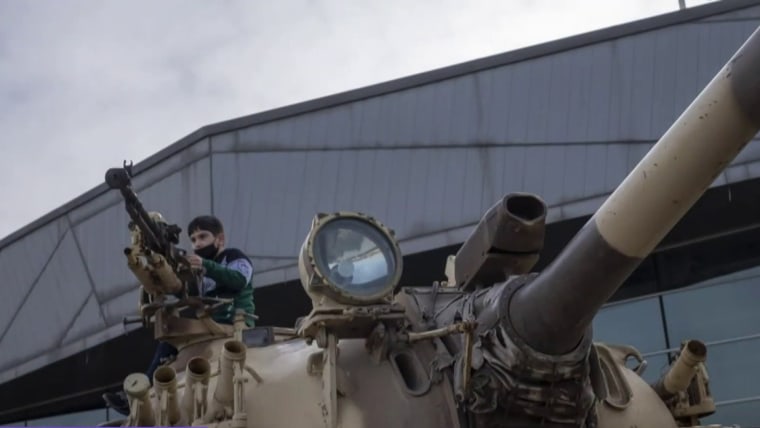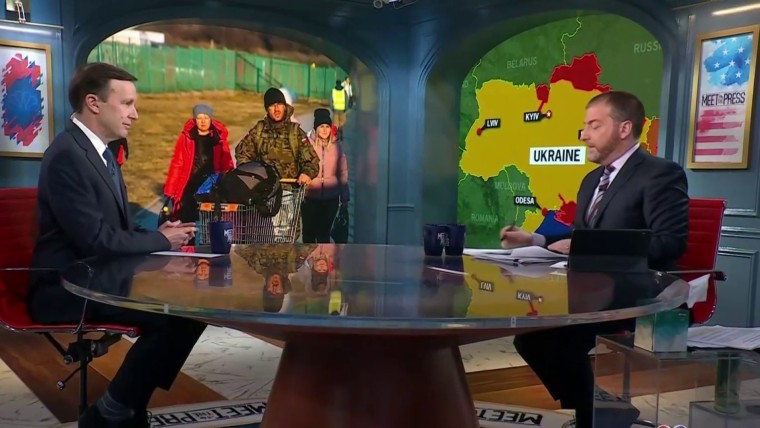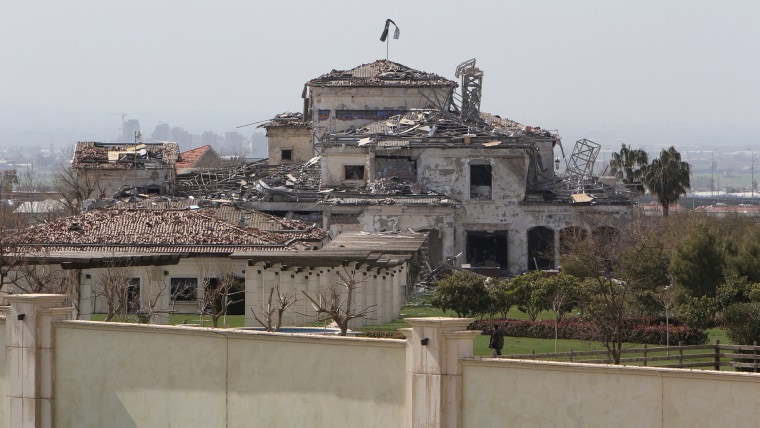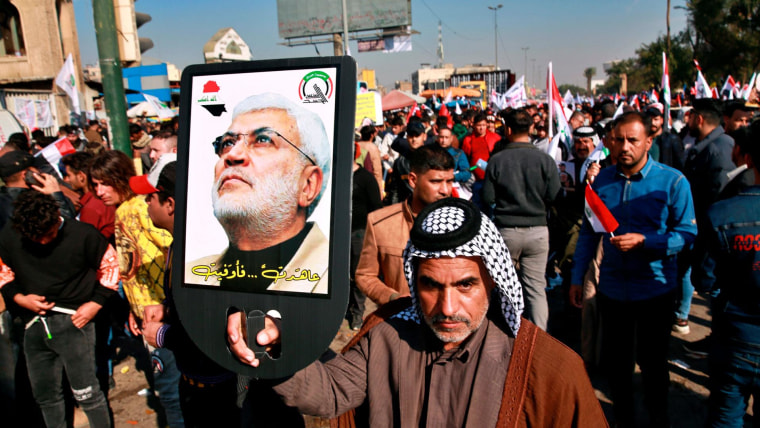Donald Trump imposed greater than 1,000 sanctions on Iran as president, however one of them might show to be a “poison pill” that derails an effort by his successor to revive the 2015 nuclear deal designed to stop Iran from constructing an atomic bomb.
Trump withdrew the U.S. from the deal in 2018 and blacklisted Iran’s Revolutionary Guards, a strong arm of the Iranian army, as a overseas terrorist group in 2019. Now negotiations aimed toward renewing the nuclear deal are at an deadlock over the sanction, with Iran demanding the Biden administration elevate the U.S. terrorism designation, in line with a present official and three sources aware of the discussions.
The discussions between Iran and world powers got here tantalizingly near clinching an settlement in late February however turned slowed down after Russia raised contemporary issues and as Iranian officers pushed for the lifting of the terrorism designation on the Islamic Revolutionary Guard Corps, or IRGC, the sources stated.
The Biden administration provided a proposal to elevate the designation in return for assurances from Iran to not retaliate towards U.S. officers for the 2020 killing of a prime Iranian basic, Qassem Soleimani, who died in a U.S. drone strike in Baghdad, the sources instructed NBC News. Iran rejected the proposal and responded about two weeks in the past with a counterproposal, the main points of which stay unclear.
The Biden administration has but to reply formally to the Iranian counterproposal, the sources stated.
“The ball is in Biden’s court,” stated one supply briefed on the discussions.
Now administration officers are debating easy methods to proceed, understanding that lifting the terrorism label would spark a scathing response in Congress and amongst Middle East allies.
“There’s no doubt that this is a Trump trap for Biden,” stated Ali Vaez, of the International Crisis Group, a assume tank.
“The irony is the current stalemate was deliberately pre-manufactured by the Trump administration to put their successor exactly where they are right now,” stated Vaez, a robust supporter of the 2015 Iran deal.
A senior Biden administration official urged it was as much as Iran to resolve the deadlock.
“We are not going to negotiate in public. The president has made clear he’ll do what’s in the best interest of U.S. security — and the onus here is really on Iran at this stage, particularly on this issue.”
Iran’s U.N. mission didn’t reply to a request for remark.
The 2015 deal, often known as the Joint Comprehensive Plan of Action or JCPOA, imposed strict limits on Iran’s nuclear program in return for an easing of financial sanctions, together with releasing Iranian funds blocked in overseas banks. In 2018, Trump pulled the U.S. out of the JCPOA and reimposed U.S. sanctions whereas including new sanctions as nicely.
Critics accused the Trump administration of deliberately introducing “poison pill” sanctions that might make it troublesome for the following president to revive the accord. But officers on the time stated the sanctions had been designed to hammer Iran as half of a “maximum pressure” marketing campaign to pressure extra concessions from Tehran and to weaken the regime.
Richard Goldberg, who served within the Trump White House nationwide safety council and strongly opposes reviving the JCPOA, stated the impetus for imposing extra sanctions towards the Revolutionary Guards and different entities initially got here from Congress, earlier than the Trump administration pulled the U.S. out of the nuclear deal.
In 2015, when President Barack Obama’s administration made the case for the deal, officers stated the U.S. would retain the authority to impose sanctions on Iran unrelated to its nuclear program, together with focusing on organizations allegedly supporting terrorism. In 2017, lawmakers from each events backed laws that launched new sanctions on Iran and laid the muse for a U.S. president to sanction the Revolutionary Guards. Former Obama administration officers on the time argued towards the laws, warning it might undermine the components underpinning the 2015 nuclear deal.
“The broader problem here is the Obama administration was adamant that nothing could prevent the U.S. from imposing terrorism, missile and human rights sanctions,” stated Goldberg, now a senior adviser on the Foundation for Defense of Democracies, a assume tank. Congress determined to “test the proposition,” he stated, and now the Biden administration is grappling with the aftermath.
After practically a yr of negotiations, Iran and the U.S., Britain, France, Germany, Russia and China managed to largely resolve the query of which sanctions can be lifted in accordance with the unique deal — apart from the blacklisting of the IRGC.
The U.S. authorities has accused the Revolutionary Guards of killing a whole lot of U.S. troops in Iraq and supplying weapons and coaching to proxy forces in Syria, Lebanon and Yemen. Over the previous twenty years, the U.S. has launched an array of sanctions towards the IRGC and people within the pressure over its ballistic missile program and alleged terrorism and human rights violations.
Most former officers and regional analysts say lifting the terrorism designation on the IRGC would have little sensible impact because the group would stay underneath a myriad of different U.S. sanctions.
But the transfer carries potent political symbolism, for Iran, for the United States and for Iran’s foes within the Middle East.
As for attainable home political response within the United States, the Biden administration acknowledges “they would get creamed” if the terrorism designation was lifted with out situations, one former U.S. official stated.
Jettisoning the designation presents a “messaging problem” at a troublesome second, in line with Matthew Leavitt of the Washington Institute for Near East Policy assume tank.
“America’s partners and allies in the region, especially the Gulf states and Israel, are extremely concerned that a renewed nuclear deal will empower Iran at a time when the United States is perceived to be stepping back from the region,” Leavitt wrote not too long ago.
Lifting the designation additionally quantities to an try by the Iranians to renegotiate the 2015 nuclear deal, because the Revolutionary Guards’ standing is unrelated to the settlement, in line with Eric Brewer, a former senior U.S. official and now senior director on the Nuclear Threat Initiative, a assume tank.
The actual subject isn’t the sensible worth of the terrorism designation however “the domestic political ramifications of its removal, the negative signals it would send to Gulf partners when relations are already strained, and, perhaps most importantly, that doing so would pull us squarely into territory that is outside the scope of the original deal,” Brewer stated.
A present U.S. official and two sources aware of the problem say the administration isn’t able to elevate the terrorism designation with out Iran providing one thing of equal worth in return. Previously, Iran has rejected U.S. proposals to carry talks on Iran’s missile program or its actions within the Middle East.
From Washington’s level of view, the Revolutionary Guards’ standing is unrelated to the nuclear settlement and due to this fact would require Iran to grant concessions on different points.
A State Department spokesperson stated if Iran needs sanctions lifted which are “beyond the JCPOA, they will need to address concerns of ours beyond the JCPOA.”
Asked this month if the Revolutionary Guards’ was a terrorist group, Secretary of State Antony Blinken instructed NBC’s Andrea Mitchell: “They are.”
The debate over the terrorism designation coincides with rising concern over threats of vengeance from Iran over the U.S. killing of Soleimani, who led the Revolutionary Guards’ Quds pressure, the guards’ abroad arm.
On the second anniversary of the assassination of Soleimani, Iranian President Ebrahim Raisi and the Soleimani’s successor, Gen. Esmail Ghaani, vowed revenge towards Trump and different former officers for focusing on the Iranian basic.
Iran additionally imposed “sanctions” towards greater than 50 Americans it stated had been related to Soleimani’s killing, which it known as an act of “terrorism.” The record included former senior officers within the Trump administration and prime army officers, together with the chairman of the U.S. Joint Chiefs of Staff, Gen. Mark Milley, and the previous head of U.S. Central Command, Gen. Frank McKenzie.
Jake Sullivan, Biden’s nationwide safety adviser, responded with an uncommon assertion, saying the United States would defend all Americans going through threats from Iran and warned Tehran that it could face “severe consequences” if it attacked any Americans.
The Biden administration has ordered 24-hour safety for Mike Pompeo, Trump’s former secretary of state, and former Iran envoy Brian Hook, attributable to what it deems credible threats towards the 2 former officers, who helped form Trump’s Iran coverage. The safety particulars value about $2 million a month, in line with the State Department.
In its annual risk evaluation issued final month, U.S. intelligence businesses stated that Iran will proceed to pose a risk to Americans, to plot terrorist assaults and that Tehran stays dedicated to cultivating networks contained in the United States.
Supporters of reviving the 2015 nuclear deal say it could be a grave mistake to permit the problem of blacklisting the Revolutionary Guards to torpedo an arms management settlement designed to stop Iran from creating a nuclear arsenal.
The penalties of permitting the nuclear deal to break down can be “catastrophic,” stated Sen. Chris Murphy, D-Conn.
“It would be political malpractice for that to be a sticking point,” stated Murphy, referring to the designation of the guards’ as a overseas terrorist group (FTO).
“I understand Republicans are going to over-hype the significance of the FTO designation. And we’re going to have to be prepared to explain to the American people what the stakes are of not getting a deal and how practically insignificant that designation is,” Murphy stated.
For a number of months, the Biden administration has warned that point is operating out to wrap up the nuclear negotiations and that the United States was not prepared to participate within the discussions indefinitely.
In distinction to U.S. officers’ public feedback in regards to the threat of the nuclear talks collapsing, Iran’s supreme chief, Ayatollah Ali Khamenei, stated on Tuesday the nuclear negotiations “are progressing well.”
Iran seems assured that it has a robust negotiating hand and that it could extract extra concessions from the West, in line with Henry Rome, deputy head of analysis and an Iran analyst on the Eurasia Group, a political threat evaluation and consulting agency.
“Their economy has stabilized in a big way. They have a new president who is pursuing a lot of the hardline wish lists. Their nuclear program continues to race ahead unabated.” Rome stated. “So I think they’re quite clear they’re not desperate at this point. And I think it’s likely that they’re trying to use that to their advantage to see what they can get, especially in light of a war in Europe and high energy prices.”
Despite U.S. warnings that the negotiations are at a make-or-break level, the administration has not issued warnings that it’ll improve financial strain on Iran if the talks fail or take into account army pressure if essential to cease Iran from buying the bomb.
As a consequence, Iran doesn’t seem to really feel strain to make extra compromises, stated Karim Sadjadpour, a senior fellow on the Carnegie Endowment for International Peace, a assume tank. “They have no reason to believe we’re serious,” he stated.
The State Department spokesperson stated “the administration is preparing equally for scenarios with and without a mutual return to full implementation of the JCPOA.”






